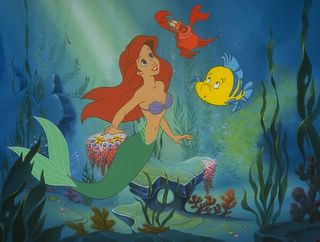To swim, or not to swim

Continuing my "Absolutely Irrelevant" series...
On Friday I was getting my hair cut by the little Asian laday down the street when she, for some reason or another, divulged that she didn't know how to swim. My attention instantly latched on to such a quizzical notion. No offense to any of you aquatically-challenged out there, but how can you not know how to swim? It seems as simple and basic as a rythmic movement of your arms and legs, and indeed it is. Needless to say, I was completely preoccupied with trying to figure it out during the rest of my haricut, and have puzzled over it since. I've come up with two possible - and I think plausible - scenarios in which someone might not be able to swim.
The first is the psychological explanation. This one's pretty straightfoward. I would conjecture that the non-swimmer has a simple phobia (hydro- or aqua-?) and that when immersed in deeper-than-waist water goes into panic mode. In this case, "I can't swim" should probably taken as "I experience anxiety when forced to keep myself afloat, and therefore prefer to exclude myself from such situations." Of course, this can be overcome by therapy and other crap, so that's the boring one.
The more interesting explanation I came up with was evolutionary. Let me try to go through my (probably horribly flawed) thought process. Most mammals have at least the ability to keep themselves afloat and head toward solid ground. Humans are mammals, and I think it's safe to say that an overwhelming majority of people CAN swim, as opposed to those who cannot. Note that here, by "can't swim," I mean to say that a person has absolutely no inherent physical capacity to keep himself afloat, and that any phobia should be disregarded. Of course, we are human, so we can all learn to swim, but this ability should also be disregarded.
At this point, I assert that the difference between swimmers and non-swimmers is genetic. I think it's a fairly self-sufficient claim. It implies that at some point back in the day, selection pressure for "swimmer" was high, and allowed that certain genetic combination to flourish. This also makes sense, especially in consideration of the following scenario. Humans evolved near large bodies of water - probably rivers. Accidents invariably happened, and anyone without the "swimmer" set of genes, a "non-swimmer," would've drowned. Over time and after several iterations, the non-swimmers would be effectively wiped out. This is all good and makes sense, but it's not the end of the story. At some point we have to append to this story the human ability to learn, and this is where it gets more interesting.
At a later point in human evolutionary history, we developed a problem solving ability that hinged on lightning quick reaction times. Hence, a solution to the problem of drowning was made available to those (very, very few) non-swimmers. Couple this ability to escape with the ingenuity that allowed humans to be essentially SAFER when near the water, and the non-swimmers can make another run at spreading in the general population, this time with little to no adverse pressures. Still, non-swimmers, at a relatively low percentage, reach a limit of spread, since there is no positive association between being a non-swimmer and flourishing. So we end up with a number of people that have no inherent physical ability to swim.
Zoom, zoom, zoom, fast forwarding to the modern day. Someone says "I can't swim." They might actually be right at the most basic level - the physical one. But at that brilliant moment when the first person was zapped with the amazing thing we call consciousness, we were all given the ability to learn how to swim, genetic makeup and materialist biology be damned. So we can tell that person to simply transcend their physical limitations, pay for some swim lessons, and presto, they're cured. Thus, barring severe mental deficiencies, "I can't swim" is a lie. We win.
Oh yeah, I forgot, there's also a third scenario, which just might be the most credible. Read it here, it's amazing.





4 Comments:
Holy crap that sea-ape article is amazing. It still doesn't explain why certain ethnicities are less prone to swimming, but saying any more would brand me a racist! There, I said it.
that sea ape crap was pretty lame. The real question is why are why are asians and africans known as poor swimmers?
Because both red Kool-Aid and Honda Civics are denser than water.
so you and quincy are too busy playing with yourselves to tread water?
Post a Comment
<< Home